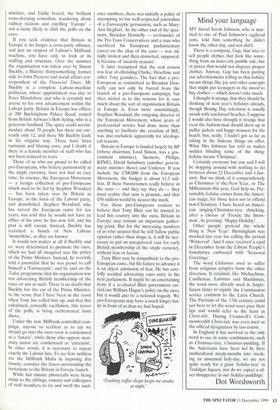Mind your language
MY friend Sarah Johnson, who is mar- ried to one of Paul Johnson's egghead sons, told him something he didn't know the other day, and nor did I.
There is a company, Gap, that tries to sell people clothes that look like some- thing from an inner-city jumble sale, but at prices that would not disgrace proper clothes. Anyway, Gap has been putting out advertisements telling us that holiday means things like joy and other concepts that might put teenagers in the mood to buy clothes — which doesn't take much.
I thought it strange that they should be thinking of next year's holidays already, though Boxing Day television is usually awash with sun-kissed beaches. I suppose I would also have thought it strange that even the fashion-mad should dress up in puffer jackets and baggy trousers for the beach; but, really, I hadn't got as far as taking in the hideous things on offer. What Mrs Johnson has told us makes sudden blinding sense of the thing: holiday means 'Christmas'.
Certainly everyone but you and I will be slopping around with nothing to do between about 23 December and 4 Jan- uary. But we think of it compendiously as Christmas-'n'-the-New-Year, or The Millennium this year, God help us. Pre- sumably holiday comes from the Ameri- can usage, for those keen not to offend non-Christians. I have heard an Ameri- can singing-Christmas-tree shrieking, after a chorus of 'Frostie the Snow- man', its greeting: 'Happy Holiday'.
Other people pretend the whole thing is `New Year'. Birmingham was mocked last year for calling the period IA/interval'. And I once received a card in December from the Libyan People's Jamahiriya embossed with 'Seasonal Greetings'.
The word Christmas used to suffer from religious scruples from the other direction. It retained, like Michaelmas, Candlemas, Lammas and Martinmas, the word mass, already used in Anglo- Saxon times to signify the Communion service common to the Latin Church. The Puritans of the 17th century could not bear to let the word mass pass their lips and would refer to the feast as Christ-tide. During Cromwell's Com- monwealth Christ-tide was even used as the official designation by law-courts.
In England it has survived as the only word to use in some combinations, such as Christmas-tree, Christmas-pudding. If
the Americans have been led by their multicultural mealy-mouths into invok- ing an unnamed holy-day, we are not
quite ready for a giant 'holiday-tree' in Trafalgar Square, nor do we expect a sil- ver thruppence in our 'holiday-puddings'.
Dot Wordsworth


























































































 Previous page
Previous page